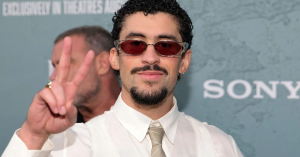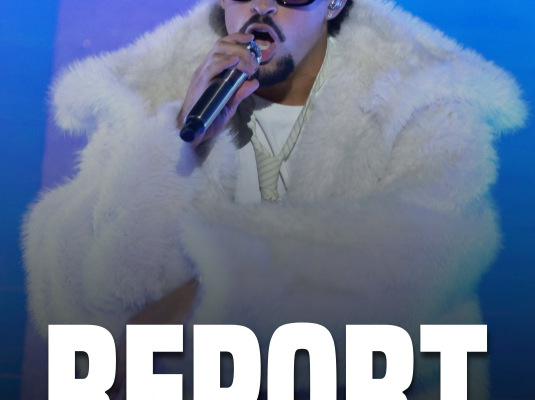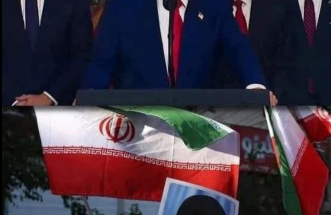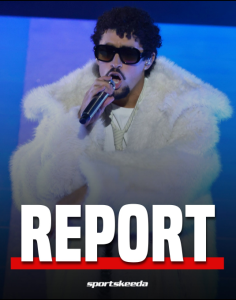
“This is for my people, my culture, and our history”: Bad Bunny to Headline the Super Bowl Halftime Show
When global superstar Bad Bunny announced that he would be headlining the Super Bowl halftime show, his words carried more than excitement—they carried history. Standing tall as one of the most influential Latin artists in the world, he declared: “This is for my people, my culture, and our history.” With that single line, Bad Bunny not only embraced his monumental achievement but also transformed it into a cultural milestone for millions of fans who see themselves reflected in his music and journey.
From Puerto Rico to the World Stage
Born Benito Antonio Martínez Ocasio in Vega Baja, Puerto Rico, Bad Bunny’s story has always been one of authenticity. He emerged from humble beginnings, uploading tracks on SoundCloud while working as a grocery store bagger. His raw lyrics, unapologetic style, and unique blend of reggaeton, trap, and Latin rhythms resonated with listeners who were hungry for fresh sounds that spoke their truth.
Within a few years, he became a household name—not only in Latin America but across the globe. His albums broke streaming records, his collaborations redefined genres, and his concerts became cultural events. Now, the Super Bowl stage—the most watched musical platform in the United States—awaits him.
For a kid from Puerto Rico who once dreamed of music from his bedroom, this moment is more than success. It’s vindication. It’s proof that representation matters, that Spanish-language music is not a niche, and that Latin culture belongs in the spotlight.
The Power of His Words
When Bad Bunny said, “This is for my people, my culture, and our history,” he was not simply hyping up fans. He was reminding the world that this moment belongs to millions. For Puerto Ricans, it is a powerful acknowledgment of their resilience, creativity, and identity. For Latin Americans everywhere, it’s validation—proof that their music, language, and traditions have carved an unshakable place in global culture.
The halftime show has often been criticized for its lack of diversity, but in recent years it has become a platform for artists of color to showcase their heritage. Jennifer Lopez and Shakira made headlines in 2020 with their electrifying celebration of Latin music. Now, Bad Bunny takes that torch forward, representing a younger generation and a different sonic palette, one that blends reggaeton, trap, hip-hop, and even rock influences.
A Cultural Milestone
The Super Bowl halftime show is one of the most watched televised events worldwide, with audiences often exceeding 100 million. For an artist to take center stage is a career-defining honor. For a Spanish-speaking artist like Bad Bunny, it is revolutionary.
He is not only performing songs in Spanish but also challenging the dominance of English in mainstream American entertainment. His presence at the Super Bowl is a reminder that music transcends language. Rhythm, energy, and emotion need no translation. Millions will sing along—even if they don’t understand every lyric—because the music carries the spirit of celebration, struggle, and triumph.
Bad Bunny’s Global Impact
Bad Bunny is more than a musician; he is a cultural phenomenon. His fashion choices challenge gender norms, his lyrics speak to social justice, and his performances highlight issues that often get overlooked in mainstream entertainment.
-
Fashion as Resistance: Whether wearing nail polish, skirts, or oversized streetwear, Bad Bunny embraces style as a form of expression. By doing so, he dismantles rigid definitions of masculinity and opens space for conversations about identity.
-
Social Commentary: His songs often weave in reflections on politics, inequality, and the realities of life in Puerto Rico. He has spoken out about issues like climate change, colonialism, and the treatment of marginalized communities.
-
Representation: For millions of young Latinos, seeing someone who looks like them, speaks like them, and embraces their culture on one of the world’s biggest stages is deeply empowering.
His halftime performance will not just be entertainment; it will be a statement.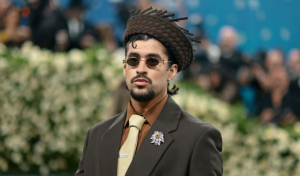
What Fans Can Expect
Though details of the halftime show remain under wraps, fans are already buzzing with anticipation. Bad Bunny is known for his high-energy concerts, theatrical visuals, and bold artistic choices. His performances are not just about singing songs—they are immersive experiences.
Fans speculate that his setlist might include some of his biggest hits, such as “Tití Me Preguntó,” “Yo Perreo Sola,” or “Dakiti.” Others hope for special guest appearances, as collaborations have always been central to his artistry. Whether he invites reggaeton legends like Daddy Yankee or global stars he has worked with, like Drake or Rosalía, one thing is certain: the show will be electric.
But beyond the music, fans expect the halftime show to highlight Puerto Rican pride and Latin culture. Bright colors, Caribbean rhythms, and symbolic visuals may all play a role in his performance. Just as Beyoncé infused her halftime show with messages of Black empowerment and Shakira with Colombian heritage, Bad Bunny is poised to celebrate Puerto Rico and the broader Latin world.
The Broader Significance
Bad Bunny’s rise to the Super Bowl halftime stage comes at a moment when Latin music is at its peak globally. From reggaeton to bachata, Latin sounds dominate streaming platforms, nightclubs, and festival stages. The genre is no longer confined to Spanish-speaking countries—it is shaping global pop culture.
His headlining performance cements that dominance. It proves that Latin artists are not side acts or special guests—they are the main event. It sends a clear message to the entertainment industry: representation sells, diversity resonates, and audiences are ready for more.
Reactions From Fans and Fellow Artists
The announcement of Bad Bunny as halftime headliner sparked an explosion of joy across social media. Fans expressed excitement not only for the performance but for what it symbolizes:
-
“This isn’t just for Puerto Rico—it’s for all Latinos. We are finally seen.”
-
“Bad Bunny has changed the game. He’s showing the world that our language, our music, and our culture deserve to be celebrated.”
-
“I cried when I read the news. This is history.”
Fellow artists also chimed in, many congratulating him and recognizing the significance of the moment. For them, his achievement is a collective win for the Latin music industry.
A Celebration of History
Bad Bunny’s declaration—“This is for my people, my culture, and our history”—is more than a catchphrase. It is a promise. It is a vow to honor the struggles, triumphs, and legacies of those who came before. It is about recognizing the roots of reggaeton and Latin trap, genres born out of marginalized communities, and elevating them onto the most prestigious stage in American entertainment.
It is also about rewriting history. For too long, Latin artists were sidelined, their contributions minimized or ignored. Now, Bad Bunny is part of a new chapter—one where their music is not only heard but celebrated at the highest level.
Conclusion: A Moment That Belongs to Everyone
When the lights go down and the first beats of Bad Bunny’s halftime show echo through the stadium, it will be more than a performance. It will be a cultural reckoning, a celebration of identity, and a reminder of how far representation has come.
For millions of Latinos watching around the world, it will feel deeply personal. His words—“This is for my people, my culture, and our history”—will echo through living rooms, hearts, and generations.
And when history remembers this Super Bowl, it won’t just be about the touchdowns or the final score. It will be about the night Bad Bunny stood on the biggest stage in the world and turned it into a celebration of Latin pride, proving once again that music knows no borders, and culture cannot be contained.
